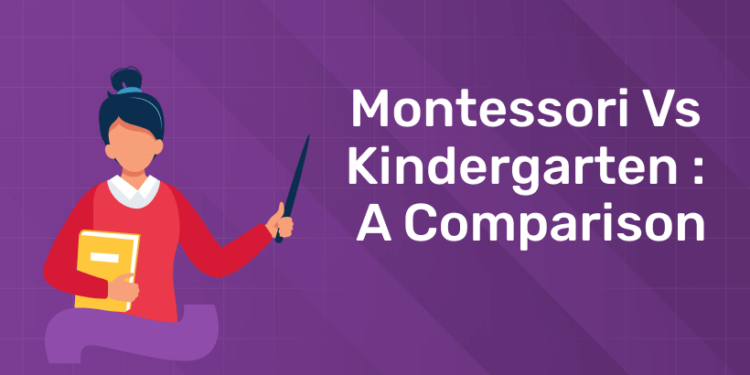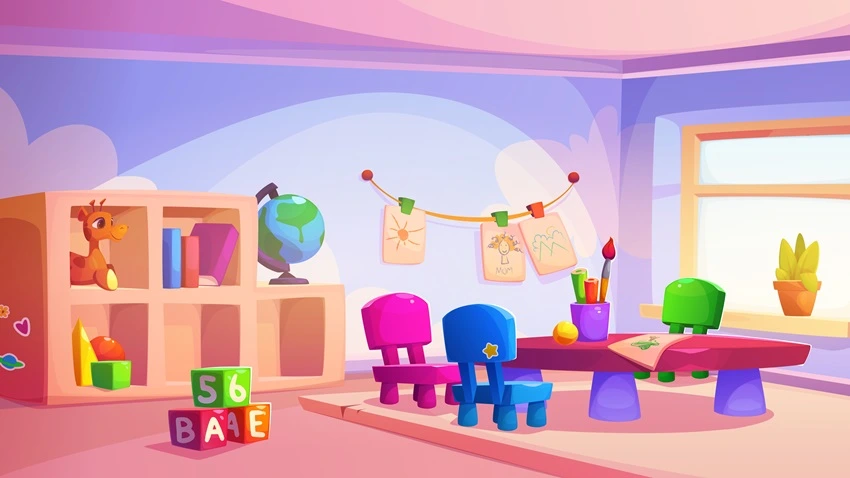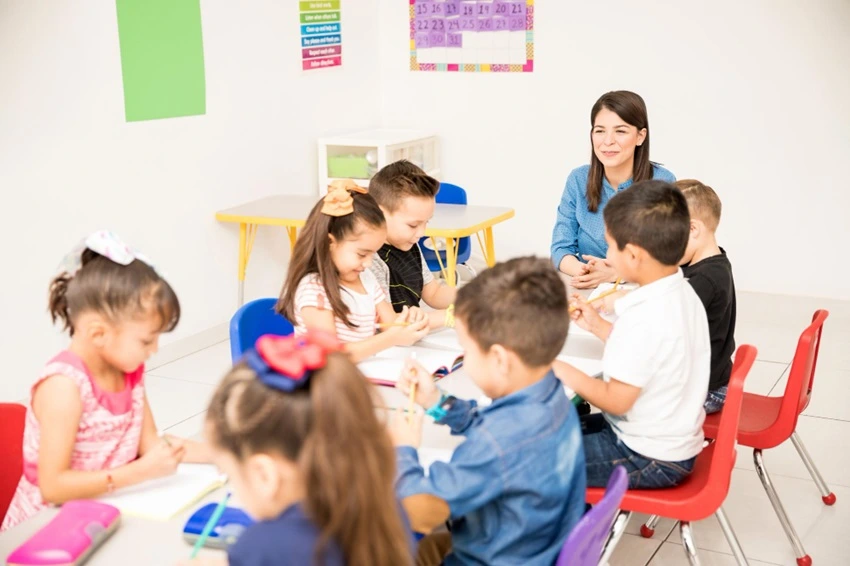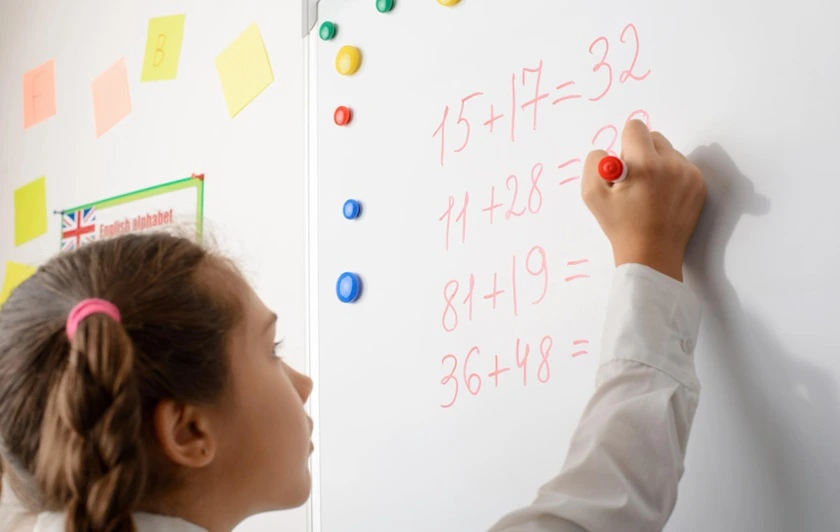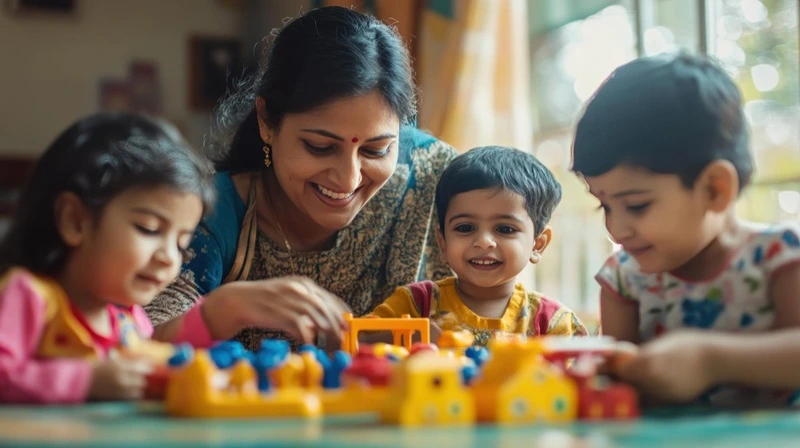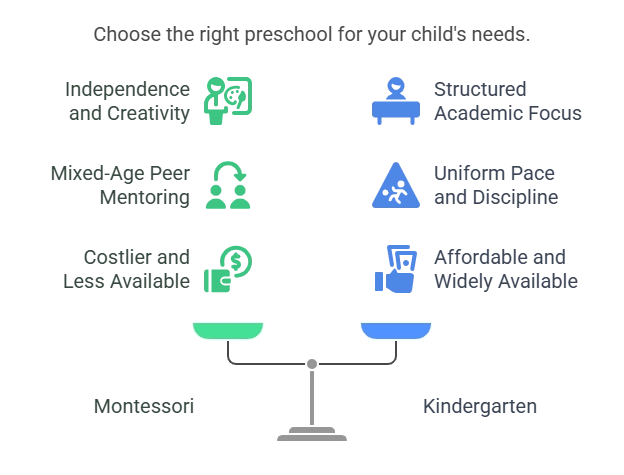Table of Contents
Montessori and Kindergarten are two different educational philosophies. Mainly focused on early childhood development. Montessori was founded by Dr. Maria Montessori. It’s all about self-directed learning, hands-on exploration, and mixed-age classrooms. Kindergarten originated in Germany. Main goal is to prepare children for formal schooling through structured lessons, socialization, and early academic skills.
This blog will do a comparison. To know the stark difference between the Montessori and the Kindergarten approach to early childhood education. By testing the key aspects such as philosophy, curriculum, teacher roles, assessment methods, and outcomes. This blog will give readers an overview of the similarities and differences between these two educational models.
Montessori vs Kindergarten: Overview
When it comes to early childhood education, the choice between Montessori and Kindergarten isn’t just about curriculum, it’s about philosophy.
Montessori, founded by Dr. Maria Montessori, centres around child-led exploration, where independence and hands-on learning shape the experience. Imagine a calm, thoughtfully prepared environment where children are free to choose their activities and learn at their own rhythm, without the pressure to match others. The entire setup is designed to support each child’s unique pace and curiosity.
In contrast, Kindergarten, based on Friedrich Froebel’s philosophy, leans towards a structured, teacher-directed approach. It aims to prepare children for formal schooling through group learning, storytelling, and academic foundations. In India, this often translates into following standardised boards like CBSE or ICSE, making the experience more uniform and outcome-driven.
Choosing the right option means understanding your child’s needs, temperament, and learning style. Are they curious explorers who thrive on freedom, or do they need routine and structure to feel secure?
Montessori vs Kindergarten: Learning Experience
1: What is the primary focus of the first plane of development in the Montessori method?
Montessori’s curriculum isn’t just flexible, it’s designed to mirror real life. Children engage with practical life skills (buttoning shirts or pouring water), sensorial play (sorting textures and colours), early math tools (bead chains and checkerboard), and phonics-based reading. The goal is not just to teach facts but to help children understand concepts through self-directed discovery.
Imagine a 5-year-old mastering multiplication not through memorisation but by physically working with beads and counting boards; this is the Montessori way.
Kindergarten, on the other hand, follows a more traditional route. Activities revolve around alphabet recognition, basic counting, rhyme, and worksheets. There’s a clear emphasis on preparing children for primary school, especially in India, where board expectations often push early academic drilling.
While Montessori believes in freedom within limits, Kindergarten believes in repetition and routine. One nurtures the learner; the other trains the student.
Get Certified & Start Your Montessori Career
Montessori Teacher Training Course by Entri App: Gain expert skills, earn certification, and kickstart your teaching career.
Join Now!Montessori vs Kindergarten: The Teacher’s Role
Here’s where the contrast really stands out.
In Montessori, teachers are more like gentle guides. They quietly observe, introduce learning materials at the right time, and step back. If a child is engrossed in tracing sandpaper letters or building towers with number rods, the teacher lets them dive deeper. Autonomy and confidence grow organically.
In Kindergarten, the teacher takes the lead. They manage the class, set the pace, and ensure every child is on track with the day’s lesson, be it reciting a rhyme or finishing a worksheet. This works well for children who benefit from a clear structure and group engagement.
So, while Montessori teachers trust the child to lead their own learning journey, Kindergarten teachers ensure uniformity and school readiness through direct instruction.
Register for the Entri Elevate Montessori Teacher Training Program! Click here to join!
Montessori vs Kindergarten: Developmental Areas
Montessori nurtures holistic development, cognitive, social, emotional, and physical, through diverse activities. Practical life tasks (tying shoes) build fine motor skills, while mixed-age groups (3–6 years) foster social learning. Kindergarten focuses on academic and social development, teaching letter recognition and teamwork via group games. Emotional growth is supported through guided interactions, but physical skills may be less emphasized. Montessori’s broad approach suits varied learning styles, while kindergarten targets school readiness, critical for India’s formal education system. Guide to child development.
Montessori vs Kindergarten: Pros and Cons
Montessori
-
Pros: Encourages independence, creativity, and self-paced learning; mixed-age groups promote peer mentoring; hands-on materials like the Checkerboard deepen understanding.
-
Cons: Less structured, which may not suit children needing clear guidance; Montessori schools can be costlier in India; transition to traditional schools may require adjustment.
Kindergarten
-
Pros: Prepares children for formal schooling with an academic focus; structured environment fosters discipline; widely available and often more affordable in India.
-
Cons: Uniform pace may limit individual exploration; emphasis on rote learning can stifle creativity; less focus on practical life skills. Compare preschool pros and cons.
Start your journey to becoming a certified Montessori teacher! Get free Demo Here!
Get Certified & Start Your Montessori Career
Montessori Teacher Training Course by Entri App: Gain expert skills, earn certification, and kickstart your teaching career.
Join Now!Montessori vs Kindergarten: Right Option
Choose Montessori if your child is self-motivated, curious, and thrives in flexible settings. It’s ideal for parents valuing child-led learning and holistic growth, though costs and availability in India may be factors. Opt for kindergarten if your child benefits from structure and you prioritize academic readiness for CBSE/ICSE systems. Visit local Montessori and kindergarten programs to observe their environments. Consider your child’s personality, independent or group-oriented, and your long-term educational goals to decide. Tips for choosing a preschool.
Start Your Child’s Learning Journey
Ready to pick the perfect path? Dive into our Guide to Early Childhood Education in India for more insights. Schedule a visit to a Montessori or kindergarten near you to see the difference. Set your child up for success with the right early childhood education today!
| Also Read | |
| Montessori Learning Materials | |
| Practical Life Tools Creation Project | |
| Montessori Pink Tower Making | |
| Knobbed Cylinders in Montessori |
Get Certified & Start Your Montessori Career
Montessori Teacher Training Course by Entri App: Gain expert skills, earn certification, and kickstart your teaching career.
Join Now!Frequently Asked Questions
What is the main difference between Montessori and Kindergarten education?
The main difference lies in their educational philosophies and approaches. Montessori education emphasizes independence, self-directed learning, and hands-on exploration, while Kindergarten focuses on preparing children for formal schooling through structured lessons and activities.
How do Montessori and Kindergarten classrooms differ in terms of teacher-student interactions?
In Montessori classrooms, teacher-student interactions tend to be more individualized and student-centered, with teachers acting as guides and facilitators. In Kindergarten classrooms, interactions are often more structured and teacher-directed, with teachers leading whole-group instruction and guiding students through planned learning experiences.
What are the benefits of a mixed-age classroom in Montessori education?
A mixed-age classroom in Montessori education allows for peer learning, mentorship opportunities, and a sense of community. Older students can mentor younger ones, fostering collaboration, leadership skills, and empathy among peers.
How does Montessori education promote independence in children?
Montessori education promotes independence by allowing children to choose their activities, work at their own pace, and take ownership of their learning. Classroom materials are designed to be self-correcting, empowering children to learn from their mistakes and develop confidence in their abilities.
What factors should parents consider when deciding between Montessori and Kindergarten for their child?
Parents should consider factors such as their child’s learning style, temperament, and developmental needs, as well as the educational philosophy and approach of each program. Visiting schools, asking questions, and considering long-term educational goals can also help parents make an informed decision.


